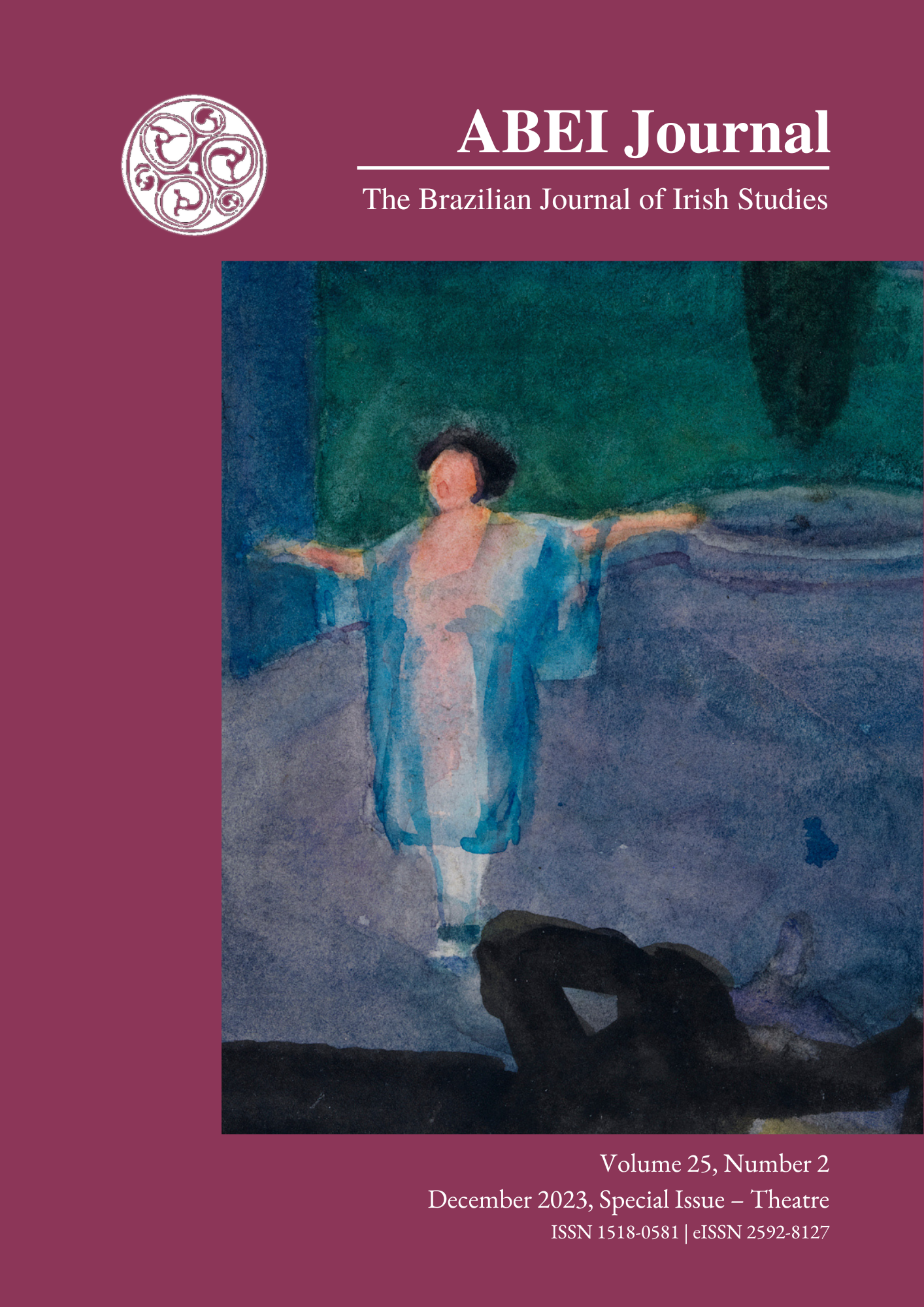From Epic Tragedy to Tragic Epic: Marina Carr’s Hecuba, Girl on an Altar, and iGirl
DOI:
https://doi.org/10.11606/issn.2595-8127.v25i2p47-62Palabras clave:
Marina Carr, Epic tragedy, iGirl, Hecuba, Girl on an AltarResumen
This article examines the genre of “epic tragedy” in two of the most recent adaptations of Greek tragedy by Marina Carr, Hecuba (2015) and Girl on an Altar (2022), as well as its reversal to produce a “tragic epic” in iGirl (2021). In the Poetics, Aristotle establishes a stark distinction between the genres of epic and tragedy. Yet, this distinction has been challenged throughout history in dramatic practices – in Euripides and Shakespeare’s tragic plays for instance – and theories – most notably by the emergence of epic theatre coined by Bertolt Brecht. Drawing from all these traditions, this article highlights Carr’s process of “epicisation” of tragedy through the implementation of a new form of dramatic speech and dramatisation of a narrative rather than a plot in Hecuba and Girl on an Altar. These strategies have influenced the creation of iGirl, which is a postmodern epic brought on stage through the lens of tragedy.
Referencias
“Playwright Marina Carr in conversation with Fiona Macintosh.” Reimagining Ancient Greece and Rome: APGRD public lectures, 9 August 2016, www.podcasts.ox.ac.uk/playwright-marina-carr-conversation-fiona-macintosh.
“That Trojan Queen. Marina Carr. TEDxDCU.” Youtube, uploaded by TEDx Talks, 18 January 2017, https://www.youtube.com/watch?v=pAKXPoJJHAs.
Aristotle. Poetics. Edited and translated by Stephen Halliwell et alii, Harvard University Press, 1999.
Brecht, Bertolt. Brecht on Theatre: The Development of an Aesthetic. Edited and translated by John Willett. Eyre Methuen, 1964.
Carr, Marina. “Hecuba.” Plays Three. Faber, 2015, pp. 205-260.
---. iGirl. Faber, 2021.
---. Girl on an Altar. Faber, 2022.
Chacón, María del Mar González. “‘This is not about love, this is about guilt and terror’: Phaedra Backwards (2011) and Forwards by Marina Carr.” Irish Studies Review, vol. 28, no. 4, 2020, pp. 481-497.
Diamond, Elin. Unmaking Mimesis: Essays on Feminism and Theatre. Routledge, 1997.
Euripides. Hecuba. Edited and translated by David Kovacs. Harvard University Press, 1995.
Gould, John. Myth, Ritual, Memory, and Exchange: Essays in Greek Literature and Culture. Oxford University Press, 2001.
Hoenselaars, Ton. “Shakespeare’s English History Plays.” The New Cambridge Companion to Shakespeare, edited by Magreta De Grazia and Stanley Wells. Cambridge University Press, 2010, pp. 137-151.
Homer. Iliad. Edited and translated by A. T. Murray and William F. Wyatt, vol. 1, Harvard University Press, 1999.
Jordan, Eamonn. “Unmasking the Myths? Marina Carr’s By the Bog of Cats… and On Raftery’s Hill.” Amid our Troubles: Irish Versions of Greek Tragedy, edited by Marianne McDonald and J. Michael Walton. Methuen, 2002, pp. 243-262.
Leavy, Adrienne. “Marina Carr interview: ‘There is an affinity between the Russian soul and the Irish soul’”. Irish Times, 6 December 2016, https://www.irishtimes.com/culture/books/marina-carr-interview-there-is-an-affinity-between-the-russian-soul-and-the-irish-soul-1.2893945. Accessed 6 May 2023.
Lonergan, Patrick. Irish Drama and Theatre Since 1950. Methuen, 2019.
Macintosh, Fiona. “‘Epic’ Performances: From Brecht to Homer and Back.” Epic Performances from the Middle Ages into the Twenty-First Century, edited by Fiona Macintosh et alii. Oxford University Press, 2018, pp. 3-15.
Macintosh, Fiona and Justine McConnell. Performing Epic or Telling Tales. Oxford University Press, 2020.
Murphy, Paula. “Staging Histories in Marina Carr’s Midlands Plays.” Irish University Review, vol. 36, No. 2, 2006, pp. 389-402.
Nietzsche, Friedrich. The Birth of Tragedy. Translated by Douglas Smith. Oxford University Press, 2000.
Rabinowitz, Nancy Sorkin. Anxiety Veiled: Euripides and the Traffic in Women. Cornell University Press, 1993.
Sihra, Melissa. Marina Carr: Pastures of the Unknown. Palgrave Macmillan, 2018.
Supple, Tim. “Theatre on an Epic Scale.” Epic Performances from the Middle Ages into the Twenty-First Century, edited by Fiona Macintosh et alii. Oxford University Press, 2018, pp. 46-59.
Torrance, Isabelle.“Trojan Women and Irish Sexual Politics, 1920-2015.” Classics and Irish Politics, 1916-2016, edited by Isabelle Torrance and Donncha O’Rourke. Oxford University Press, 2020, pp. 254–267.
Torrance, Isabelle. “Greek Tragedy and Irish Politics in the Decade of Commemorations.” Éire-Ireland, vol. 57, no. 1, 2022, pp. 189-213.
Vernant, Jean-Pierre and Pierre Vidal Naquet. Myth and Tragedy in Ancient Greece. Translated by Janet Lloyd. Zone Books, 1996.
Wallace, Clare. “Marina Carr’s Hecuba: Agency, Anger and Correcting Euripides.” Irish Studies Review, vol. 27, no. 4, 2019, pp. 512-527.
Wang, W. Michelle. “Readerly Plays: Narration and Formal Experimentation in Marina Carr’s Hecuba.” Style, vol. 54, no. 4, pp. 399-417.
Zeitlin, Froma. Playing the Other: Gender and Society in Classical Greek Literature. University of Chicago Press, 1996.
Descargas
Publicado
Número
Sección
Licencia
Derechos de autor 2023 Salomé Paul

Esta obra está bajo una licencia internacional Creative Commons Atribución-NoComercial 4.0.


